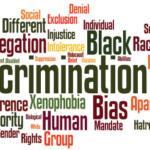“I used to love the medical field,” Sarah’s mother continues. “I’ve been working in it since I was 16, but I don’t trust them even for myself. After what I saw and experienced for months with Sarah, I don’t know if I can get [that trust] back. Every time I walk through those doors now, sadness, anger and fear come down like a flood all over me. If I could go somewhere else, I would go.”
Deterrents to Seeking Healthcare
Experiences of racism and poor communication are deterrents to seeking healthcare, even when available.15,16 What Sarah’s mother displays is the stress response from racialized trauma incurred at the individual and structural levels.17,18 Racial trauma refers to “stress responses and reactions to racialized incidents including the perceived or real threat of harm and injury, humiliating and shaming events, and witnessing racial discrimination towards oneself or other minoritized people.”19
Sarah’s mother has identified those of us she can trust. We are those from whom she feels the verbal and non-verbal communications authentically convey honor, respect and validation of her lived experience and shared humanity. We are those from whom she does not perceive the imminent threat of humiliation, shame or discrimination.
Despite the emotional trauma incurred and her misgivings about the healthcare institution, Sarah’s mother brings her daughter back biweekly for care, and Sarah’s condition has dramatically improved. She is walking without assistance and attending to most of her activities of daily living.
Repetitive experiences of perceived or blatant discrimination in daily life—& especially during healthcare encounters—can condition one to distrust the healthcare system & the people within it.
After an induction course of intravenous cyclophosphamide (Note: mycophenolate mofetil could not be readily absorbed), Sarah is on a complex, but effective, maintenance regimen of multiple immunomodulating medications that include intravenous immunoglobulin infusions, hydroxychloroquine and tofacitinib.
“What stands between a disrespected African American and the source of disrespect is almost 400 years of history, four centuries of being the target of humiliation and abuse,” writes Joy DeGruy, a sociologist and author of the book Post Traumatic Slave Syndrome: America’s Legacy of Enduring Injury and Healing. “A history of racial conflict, inequality and contempt culminates in a moment that few people not of this culture could comprehend, let alone predict. Yet every [Black American with multigenerational roots in this country] who has witnessed or heard of incidents like this understands the unspoken and ubiquitous cultural law that was operating.”20



